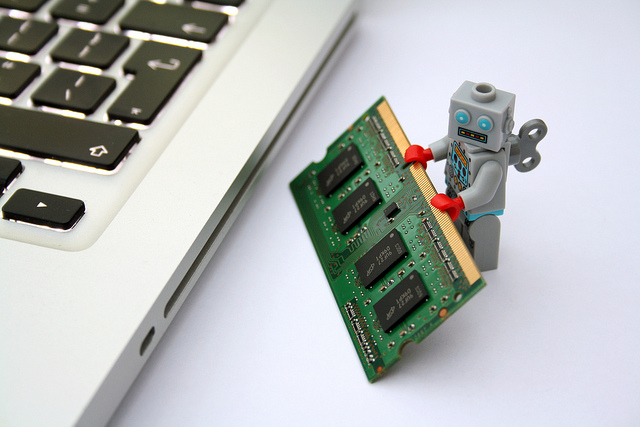Apart from vampires and the rain-soaked kiss of true love, there is no more persistent cinematic trope than computers ruling the world. They are the Skynet of the Terminator movies, the HAL of 2001, the Matrix of The Matrix and the Johnny Depp of Transcendence. In these films computer intelligence has moved far beyond the cranial capabilities of mere humans. The machines can out-think us, outfight us and can even invade other machines and reproduce themselves. Humans are merely slaves or, at best, fresh batteries.
It was hard not to think of these films after reading a couple of news items in the last month. First, the team that built Siri is now working on Viv, an artificially intelligent personal assistant that makes Siri look like a Speak ‘n’ Spell. Second, IBM announced that it has created a “neurosynaptic computing chip.” The novel chip simulates the brain’s neurons, synapses and axons. It can learn to look for and flag “interesting” objects in a video stream. Cut to scene of naked, hungry survivors being hunted like rabbits by metal overlords.
Oh, and one final news item to add some verisimilitude to that last money shot. This week a startup, One Codex, announced it wants to make it easy to search the petabytes of data about the genetic information of living creatures, including humans. Know your enemy indeed.
But, let us, please, put away our foil hats as we consider all this.
It is true that we have, collectively, created a diffuse digital database of the lives, loves, inventions and art of the human race online. For good or ill, it is a wacky fun house mirror held up to the mundane traipse of flawed bipeds for the last 30 years. We can search and we can find, using a device the size of a used bar of soap, just about anything we need to know. Go ahead, ask Siri: “What planes are overhead right now?” if you don’t believe me.
It is also true that virtual assistants like Google Now, Siri and Cortana are getting smarter all the time. They will soon be so clever that actually entering a search will seem as quaint as inputting DOS commands on a screen of green text. Search, the way Google makes money at it, will seem like a commodity offering, or even a public utility.
And, yes, robots that can walk, run, skitter and swarm are already among us.
But does all that add up to a future that plays out like a sci-fi blockbuster? I don’t think so.
I have every faith that in the next ten years the Web will be a natural language query away and that our vacation plans will be a matter of our digital valet networking with virtual valets worldwide. Maybe that will happen through wearables, maybe via implants. Probably our brains will be augmented as invisibly as our eyes are when we get LASIK eye surgery. I have no doubt manufacturing and service jobs will be passed to robots and the care and feeding of those robots to other robots.
But that is a far cry from a robot revolution, a sentient über mind and master metal race. The more we understand the human brain, using the tools we’ve invented to do that, the more we appreciate that we know little about the complex electrochemical dance that gives rise to consciousness. I think that complexity will yield more complexity that in turns unpacks a fractal depth of unfathomable richness. To compete with that using the constraints of Moore’s law is like expecting a snail to win a race against a rifle shot.
Listen to an audio version of this column, read by the author, below.
Wayne MacPhail has been a print and online journalist for 25 years, and is a long-time writer for rabble.ca on technology and the Internet.



